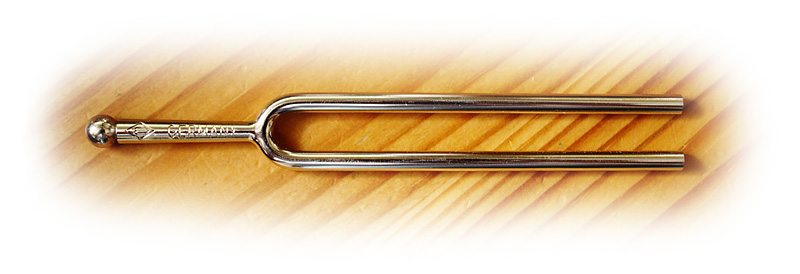Tuning the Ukulele
Do I really have to tune the ukulele myself?
Short answer: Yes! — For the hurried: Here’s the link for tuning by reference tones.
Before you start playing, your new instrument must be tuned. You really shouldn’t shirk away from it. I heared about people who bring their instrument to a music shop to let them tune it. Or those who hope that their uke will be sent to them perfectly tuned… Forget about that! It doesn’t work this way. If you don’t want your ukulele to sound utterly crooked, you absolutely have to tune it yourself on a regular basis, there’s no way around it.
The best tuner
Most other ukulele web sites will tell you to get an electronic tuner. However, I believe that using an electronic tuner has many disadvantages. It may be handy in a few situations, for example for getting an instrument roughly tuned in a noisy environment. But generally I want to advise against it. In my opinion, listening is an important part of making music. Consequently, you should tune by ear — in other words: with a tuning fork.
The most important advantage of tuning by ear is: It’s a great workout for your ears. You will develop a feeling for the purity of the intervals used for tuning, and this experience will also improve your playing. It can also help you to discover problems with your fingering technique, i.e. if you are pressing down the strings too hard (which will make the intervals and chords sound impure). This can go as far that good players can compensate some inaccuracies of their instrument by adapted tuning and fingering technique. It’s a long way to get there, but the sooner you begin training your ears, the better!
- The right tuning — which tuning should I choose for my Instrument?
- Tuning by reference tones — so you don’t even need a tuning fork. (Also about using the beat.)
- Tuning with a tuning fork — it’s not that difficult!
- Tuning with an electronic tuner — sometimes we may need that, too.
When the uke constantly goes out of tune
Especially new instruments or new strings need to be tuned very often, since the strings are still stretching a bit, which will make the tuning drop. That’s normal, and will improve over time. At the very beginning it’s worst — the tuning drops all the time, even while playing. Don’t give up! Just keep re-tuning the uke. Eventually the strings will settle in. Some players stretch their strings a bit when putting them on their instrument. I refrain on that, since it can possibly worsen inhomogeneities of the strings, which will make the intonation suffer. However it can be helpful to tune new strings a semitone higher at the beginning, which may help them settle in faster.
Of course you should make sure that the strings are properly mounted on the instrument: They must not slip through on the tuning pegs, and the knot at the bridge should not creep through the slits (depends on the bridge design). If your instrument has straight tuners, make sure the screws are tightened well (but don’t over-tighten them!). However, I *never* experienced that tuning peg’s can’t hold the strings (as sometimes can be read in reviews of some cheap ukuleles) — I’ve never seen that happen, IMHO in these cases the problem is incorrect operation of the tuners.
Faulty strings
The quality of strings isn’t visible to the eye, and even expensive string sets can contain faulty strings. A bad string will often intonate poorly and make the ukulele sound crooked, even when all strings are tuned correctly and the ukulele itself is well built and has a good setup. Sometimes it helps to turn a slightly bad string around — to take the end which was connected to the bridge and put it on the peghead, and vice versa. If this doesn’t help, replace the faulty string. Caution: If the ukulele doesn’t have a compensated saddle, the intonation of the C string will often be a bit off, even if the string itself is perfectly fine. For really precise intonation up into the highest frets, a compensated saddle is required.
Sticking strings
This happens amazingly often. If the string slots in the nut are too narrow, the strings won’t glide continuously through the slots when turning the pegs. This is quite subtle, and many people won’t notice it at all — instead they’ll believe they’re just too clumsy to tune their instrument accurately. This can be fixed by widening the slots, however this is a quite delicate matter. If you mess it up, the strings will buzz when playing. Some people advise to make the strings more slippery with graphite, but if the slots are too narrow, this won’t help too much.


 English
English  Deutsch
Deutsch